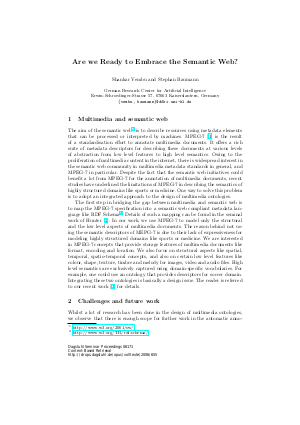Are we Ready to Embrace the Semantic Web?
Authors Shankar Vembu, Stephan Baumann
-
Part of:
Volume:
Dagstuhl Seminar Proceedings, Volume 6171
Part of: Series: Dagstuhl Seminar Proceedings (DagSemProc) - License:
 Creative Commons Attribution 4.0 International license
Creative Commons Attribution 4.0 International license
- Publication Date: 2006-09-19
File

PDF
DagSemProc.06171.5.pdf
- Filesize: 83 kB
- 3 pages
Document Identifiers
Subject Classification
Keywords
- Semantic analysis
- Multimedia ontologies
- Semantic web
Metrics
- Access Statistics
-
Total Accesses (updated on a weekly basis)
0Document
0Metadata
Abstract
The aim of the semantic web is to describe resources available on the web using metadata elements that can be processed or interpreted by machines. MPEG-7 is the result of a standardisation effort to annotate multimedia documents, and it offers a rich suite of metadata descriptors for describing these documents at various levels of abstraction from low-level features to high-level semantics. Owing to the proliferation of multimedia content in the internet, there is now a lot of interest in the semantic web community in multimedia metadata standards in general, and MPEG-7 in particular. Despite the fact that the semantic web initiatives could benefit a lot from MPEG-7 for the annotation of multimedia documents, recent studies have underlined the limitations of MPEG-7 in describing the semantics of highly structured domains like sports or medicine. This has led to an upsurge of interest in adopting an integrated approach to the design of multimedia ontologies. In our work, we describe a systematic approach to the design of multimedia ontologies in which we use MPEG-7 to model only the structural and the low-level aspects of multimedia documents. High-level semantics are described using domain-specific vocabularies. A retrieval engine based on this framework will then be able to process high-level text-based semantic queries. Whilst a lot of research has been done in the design of multimedia ontologies, a plaguing issue is the automatic annotation of multimedia content at a semantic level. It is possible to derive low-level descriptors using state-of-the-art techniques in multimedia content analysis, but the same does not hold true when it comes to analysing multimedia content at a high level of abstraction. We discuss various approaches that have been recently proposed to accomplish this task. An interesting line of discussion is the automatic population and enrichment of multimedia ontologies that offers a lot of challenges and stresses the need for efficient approaches for the semantic analysis of multimedia documents.
Cite As Get BibTex
Shankar Vembu and Stephan Baumann. Are we Ready to Embrace the Semantic Web?. In Content-Based Retrieval. Dagstuhl Seminar Proceedings, Volume 6171, pp. 1-3, Schloss Dagstuhl – Leibniz-Zentrum für Informatik (2006)
https://doi.org/10.4230/DagSemProc.06171.5
BibTex
@InProceedings{vembu_et_al:DagSemProc.06171.5,
author = {Vembu, Shankar and Baumann, Stephan},
title = {{Are we Ready to Embrace the Semantic Web?}},
booktitle = {Content-Based Retrieval},
pages = {1--3},
series = {Dagstuhl Seminar Proceedings (DagSemProc)},
ISSN = {1862-4405},
year = {2006},
volume = {6171},
editor = {Tim Crawford and Remco C. Veltkamp},
publisher = {Schloss Dagstuhl -- Leibniz-Zentrum f{\"u}r Informatik},
address = {Dagstuhl, Germany},
URL = {https://drops.dagstuhl.de/entities/document/10.4230/DagSemProc.06171.5},
URN = {urn:nbn:de:0030-drops-6559},
doi = {10.4230/DagSemProc.06171.5},
annote = {Keywords: Semantic analysis, Multimedia ontologies, Semantic web}
}
